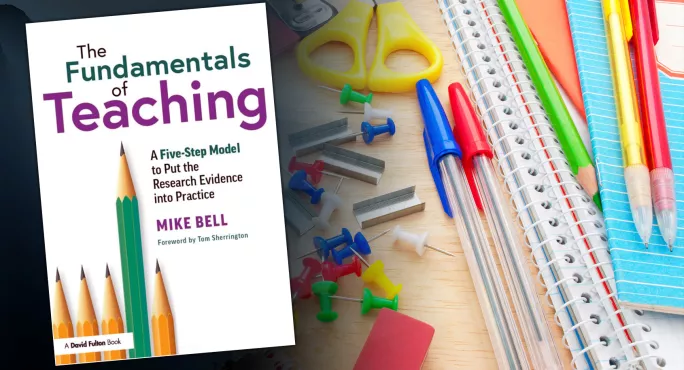
- Home
- Book review: The Fundamentals of Teaching
Book review: The Fundamentals of Teaching

The Fundamentals of Teaching: A five-step model to put the research evidence into practice
Author: Mike Bell
Publisher: Routledge
Details: 176pp; £16.99
ISBN 9780367358655
Mike Bell, a former science teacher and founder of the Evidence-Based Teaching Network, synthesises the key findings from five major research reviews for this book.
The five reviews - Robert Marzano et al and Ceri Dean et al’s Classroom Instruction that Works studies, the Education Endowment Foundation’s Teaching and Learning Toolkit, John Hattie’s Visible Learning for Teachers, Barak Rosenshine’s Principles of Instruction, and the Institute for Educational Sciences’ Organising Instruction and Study to Improve Student Learning - create a practical guide for implementing evidence-based teaching.
The guide builds on a “consensus from a whole range of evidence”, and is essential introductory reading for teachers interested in improving their practice through research-backed methods.
A commitment to quality evidence
Bell’s commitment to quality evidence is outlined in the first section of the book. Over three chapters, this section explores what reliable evidence is, and how to critically assess reliability, why the sources of evidence he has selected are good quality, and how some of the best research from classroom-based studies links to brain-based explanations of the way we learn.
By emphasising the importance of reliable, good-quality evidence as a basis for classroom practice, Bell highlights the problem of implementing changes to teaching on the back of individual research papers, which may have received media attention.
As Bell points out, the most discussed teaching methods - those favoured by politicians, journalists and parents - are often those with a low effect size. These methods, such as regular marking of students’ books, are more visible to the non-expert than more effective methods, such as dual coding or an improved questioning technique, and can therefore be perceived as more appealing.
Bell is clear, however, that pursuing methods with a low effect size is not a valuable use of teachers’ time or of schools’ resources. Instead, he lays out a five-step model, based on the points of crossover between the five research reviews that he has examined.
A five-step learning cycle
Bell’s five-step model, which he also refers to as the “learning cycle”, covers prior knowledge, presenting new material, challenge, feedback and repetition.
A key draw of the book is its focus on the practical application of research evidence in the classroom. For each of the five steps, Bell illuminates not just why they are important aspects of teaching practice from a research perspective, but also how to implement them effectively. He does this through easy-to-follow explanations and brief case studies from across subject areas and key stages.
Taking prior knowledge as an example, Bell helpfully explains how to identify missing prior knowledge as an issue in your classroom, through student questions and responses. He then suggests a series of strategies for assessing the level of prior knowledge that exists, and for filling in or repairing any gaps that may become apparent. This is broken down further into a series of bullet-pointed actions, which a teacher could reasonably take to improve this aspect of their practice.
Each chapter follows a similar structure, moving from a succinct explanation of the classroom-based research to a brief discussion of the brain-based evidence, and then on to a clear description of how these research findings can be implemented. The bullet-pointed summary sections on “putting these methods into action” make The Fundamentals of Teaching a particularly useful resource for individual teachers.
Respecting the evidence on teacher workload
While much of Bell’s book is aimed at teachers looking to improve their own individual practice, there is also plenty here to interest school leaders concerned with allocating their available resources effectively. Chapter nine is entirely dedicated to this issue, and covers everything from teacher workload and classroom technology to the effective deployment of teaching assistants.
A particularly interesting section of this chapter covers staff development. On this topic, Bell champions the necessity of giving teachers dedicated time to work on CPD, in order to follow through on ideas by trying them out and evaluating them in their own teaching. Without this focused time, Bell argues, “effective methods will not be practised and learning will not improve.”
As with much of the advice in this book, Bell is concerned here to balance the time cost to teachers with the potential for positive results for pupils. This respects the research evidence on teacher workload and wellbeing as a factor in classroom outcomes.
At just 176 pages long, and broken down into short, clearly organised sections, The Fundamentals of Teaching is an accessible and easily digested text that is perfect for time-pressed teachers and school leaders.
As an introduction to evidence-based teaching, this practical guide is a compact but valuable tool, and the suggestions for further reading located at the end of each chapter provide helpful guidance for those looking to read more deeply into the different areas that Bell covers.
Victoria Addis is an English teacher in the East Midlands, and the editor of AC Review of Books. She tweets about teaching at @ms_a_englit
Register with Tes and you can read five free articles every month, plus you'll have access to our range of award-winning newsletters.
Keep reading for just £4.90 per month
You've reached your limit of free articles this month. Subscribe for £4.90 per month for three months and get:
- Unlimited access to all Tes magazine content
- Exclusive subscriber-only stories
- Award-winning email newsletters
You've reached your limit of free articles this month. Subscribe for £4.90 per month for three months and get:
- Unlimited access to all Tes magazine content
- Exclusive subscriber-only stories
- Award-winning email newsletters

